
Intersecciones en Antropologia
Scope & Guideline
Championing open access for global understanding.
Introduction
Aims and Scopes
- Archaeological Research:
The journal emphasizes archaeological studies that reconstruct past human societies, including their lifestyles, technologies, and interactions with the environment. - Bioarchaeology:
A significant focus on bioarchaeological practices, particularly the analysis of human remains to understand health, diet, and social structures in historical populations. - Zooarchaeology and Taphonomy:
Research on animal remains, including their use and significance in ancient diets and cultural practices, as well as the processes of fossilization and preservation. - Material Culture Studies:
Investigations into the production and use of artifacts, such as pottery and lithic tools, which provide insights into technological practices and social interactions. - Environmental Archaeology:
Studies that explore the relationship between ancient human populations and their environments, including climate impacts, resource management, and ecological adaptations. - Interdisciplinary Approaches:
The journal promotes research that integrates methods and theories from various fields such as geology, biology, and chemistry to enrich archaeological narratives.
Trending and Emerging
- Indigenous Knowledge and Practices:
There is a growing emphasis on understanding indigenous practices, particularly in relation to resource management and cultural heritage, reflecting a broader recognition of indigenous perspectives in anthropology. - Interdisciplinary Integration:
An increasing trend towards integrating various scientific methods, such as isotopic analysis and geochemical studies, to provide deeper insights into archaeological findings. - Environmental Change and Adaptation:
Research focusing on how ancient populations adapted to environmental changes is gaining traction, highlighting the relevance of climate and ecological factors in shaping human history. - Mortuary Studies and Bioarchaeology:
There is a notable increase in studies examining burial practices, health, and genetic kinship within archaeological contexts, underscoring the importance of understanding social structures through death. - Technological Innovation in Archaeology:
An uptick in the use of advanced technologies, such as digital archaeology and data analysis techniques, is emerging, indicating a shift towards modernization in archaeological methodologies.
Declining or Waning
- Historical Archaeology:
There appears to be a decreasing focus on historical archaeology, particularly studies centered around colonial interactions and post-colonial contexts, suggesting a shift towards prehistoric research. - Experimental Archaeology:
Research involving direct experimental approaches to understanding ancient technologies and practices, while still present, has become less prevalent, indicating a potential narrowing of methodological diversity. - Social Anthropology:
Themes related to contemporary social anthropology, such as ethnographic studies of living communities, are less frequently addressed, perhaps reflecting a stronger emphasis on archaeological data. - Cultural Resource Management (CRM):
While still relevant, the scope of CRM studies within the journal has diminished, possibly due to changing regulations or research priorities towards more academic archaeological inquiries.
Similar Journals
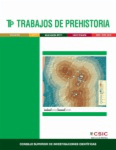
Trabajos de Prehistoria
Connecting Scholars Worldwide to Unravel the Mysteries of Human HistoryTrabajos de Prehistoria is a distinguished peer-reviewed journal published by the Consejo Superior de Investigaciones Científicas (CSIC) since 1988, and it has established itself as a vital resource in the field of archaeology and prehistory. With an impressive impact factor and an open access policy, the journal aims to disseminate high-quality research that contributes to the understanding of human history and prehistorical studies. This Spanish journal has consistently ranked in the top quartile (Q1) in both the Arts and Humanities and Social Sciences categories, reflecting its significance in advancing archaeological scholarship, with Scopus rankings placing it in the 85th percentile among its peers. Covering a broad scope of topics related to archaeology, it serves as a platform for innovative research that connects researchers, professionals, and students globally, enhancing academic dialogue and fostering interdisciplinary collaboration. Based in Madrid, European researchers and global academics alike benefit from its open access model, promoting wider distribution and accessibility of foundational studies in the field.

Magallania
Empowering Voices in the Social Sciences LandscapeMagallania is a pioneering open-access journal published by UNIV MAGALLANES, dedicated to advancing scholarly discourse in the field of Social Sciences. Since its inception in 2005, the journal has provided a platform for original research, critical reviews, and insightful analyses that address diverse issues affecting society in both local and global contexts. Based in Punta Arenas, Chile, Magallania has established itself as an essential resource for researchers, professionals, and students alike, particularly in its current position within the Q2 category of Social Sciences (miscellaneous) as of 2023. With an ongoing commitment to quality and accessibility, the journal aims to foster interdisciplinary dialogue and promote knowledge exchange, all while contributing to a deeper understanding of social dynamics and challenges. Magallania is indexed in Scopus, ranking competitively in the field; it reflects the dynamic scholarly environment that characterizes the vibrant region of Magallanes and beyond.
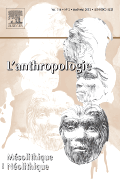
ANTHROPOLOGIE
Pioneering Research in Anthropology and Science HistoryANTHROPOLOGIE, published by Elsevier France - Éditions Scientifiques Médicales Elsevier, is a leading academic journal dedicated to advancing the fields of Anthropology and the History and Philosophy of Science. With a publication history that dates back to 1947, this esteemed journal has steadily carved its niche within the scholarly community, achieving a commendable Q2 rank in both the aforementioned categories in 2023. Although it does not offer Open Access, ANTHROPOLOGIE provides robust access options through institutional subscriptions, ensuring that researchers and practitioners alike can delve into its rich repository of knowledge. The journal's impact is underscored by its competitive Scopus rankings, particularly its position within the 65th percentile for History and Philosophy of Science and 56th percentile within Anthropology. Through rigorous peer-reviewed articles that illuminate a wide array of anthropological inquiries and philosophical debates, ANTHROPOLOGIE continues to be an essential resource for those committed to exploring the complexities of human behavior, culture, and scientific understanding in an ever-evolving world.

ANTIQUITY
Charting the Course of Cultural EvolutionANTIQUITY is a prestigious academic journal published by Cambridge University Press that has been at the forefront of archaeological and humanities scholarship since its inception in 1927. With its roots firmly planted in the United Kingdom, the journal has achieved remarkable recognition, maintaining a Q1 ranking in both the fields of Archaeology and Arts and Humanities as of 2023. With an impressive Scopus ranking of #3 out of 173 in General Arts and Humanities and #28 out of 354 in Archaeology, it underscores its significant impact and influence in shaping contemporary discourse in these domains. Although it is not an Open Access journal, ANTIQUITY provides crucial insights into the evolution of human societies through a comprehensive range of archaeological studies, reviews, and theoretical discussions. By facilitating knowledge exchange among researchers, professionals, and students, ANTIQUITY not only enriches academic literature but also fosters a deeper understanding of our past.

ARCHAEOLOGY IN OCEANIA
Uncovering the Rich Tapestry of Oceania's PastARCHAEOLOGY IN OCEANIA, published by Wiley, is a leading journal that delves into the rich and diverse archaeological landscape of the Pacific region. With a commitment to advancing knowledge in anthropology and archaeology, this esteemed publication has been pivotal in shaping scholarly discussions since its inception in 1966. Spanning generations of research, it has seen converged years of publication from 1966 to 1980 and from 2002 to 2024. With an impressive Scopus ranking placing it in the top quartiles across multiple categories - including Q2 in Anthropology and Q1 in Archeology (arts and humanities) - the journal distinguishes itself as a must-read for researchers, professionals, and students alike. Although it operates on a subscription model, its rigorous peer-reviewed articles and comprehensive studies contribute significantly to understanding the past of Oceania, making it an essential resource for those invested in this vibrant field of study.
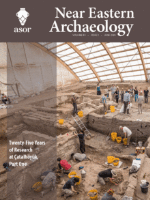
NEAR EASTERN ARCHAEOLOGY
Pioneering Insights into Archaeology and HistoryNEAR EASTERN ARCHAEOLOGY, published by University of Chicago Press, is a premier journal dedicated to the field of archaeology, particularly focusing on the rich cultural heritage and archaeological findings of the Near East. With an ISSN of 1094-2076 and an E-ISSN of 2325-5404, this esteemed publication provides a vital platform for scholars and practitioners to share their research, insights, and discoveries. The journal holds an impressive ranking in the Q1 quartile for both Archaeology and History in 2023, reflecting its significant impact within these fields and a robust history of scholarly contribution. The journal has been pivotal in shaping discussions around archaeological methodology, theory, and contemporary issues from 2002 to 2024, as it continues to reach a wide audience through various access options. With Scopus rankings placing it in the top percentiles for both History and Archaeology, NEAR EASTERN ARCHAEOLOGY represents an essential resource for researchers, professionals, and students alike, fostering the exploration and understanding of the region's archaeological narrative.
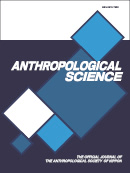
ANTHROPOLOGICAL SCIENCE
Advancing anthropological insights for a deeper understanding of humanity.ANTHROPOLOGICAL SCIENCE is a prominent journal in the field of anthropology, published by the Anthropological Society of Nippon since 1993. With a rich pedigree of scholarly contributions, this journal is an essential platform for disseminating research findings and theoretical discussions that push the boundaries of anthropological knowledge. Currently ranked in the Q3 category in Anthropology by 2023 metrics, ANTHROPOLOGICAL SCIENCE boasts an impressive position at #163 out of 502 in Scopus, placing it in the 67th percentile among its peers. While it operates under a traditional access model, the journal supports a diverse range of anthropological research encompassing cultural, biological, and archaeological perspectives. Researchers, professionals, and students will find valuable insights and innovative methodologies that foster a richer understanding of human societies and behaviors. The current trends and findings published in this journal make it a crucial resource for those involved in anthropological studies or related fields.

International Journal of Historical Archaeology
Fostering Interdisciplinary Dialogue: Shaping the Future of Archaeological ResearchInternational Journal of Historical Archaeology, published by SPRINGER, stands at the forefront of archaeological scholarship, focusing on the intricate relationship between historical events and archaeological findings. With an impressive impact factor underscored by its ranking in the Q1 quartiles across various categories, including Archeology and History, this journal serves as a premier platform for researchers, professionals, and students alike to disseminate groundbreaking findings and theoretical advancements in the field. Although it is not an Open Access publication, the journal provides valuable insights through its rigorous peer-review process, enhancing the quality of contributions. Covering a breadth of topics from 1997 to 2024, it is vital for advancing knowledge in historical archaeology and offers an essential resource for those invested in understanding our shared past through the lens of material culture. The journal's commitment to fostering interdisciplinary discussions enriches the scholarly community and supports the evolution of methodologies and perspectives within the domain.
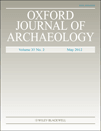
Oxford Journal of Archaeology
Pioneering Insights in Arts and HumanitiesOxford Journal of Archaeology is a prestigious peer-reviewed journal published by WILEY, dedicated to advancing the field of archaeology through innovative research and insightful discourse. Established in 1982, this journal has become a vital resource, showcasing high-impact studies that resonate within the arts and humanities, as well as interdisciplinary fields such as geography and planning. With an impressive Q1 ranking in both Archaeology and Arts & Humanities categories, and a Q2 ranking in Geography, Planning, and Development, the journal consistently maintains its reputation for excellence—evidenced by its ranking in the 81st percentile within the Scopus Arts and Humanities Archaeology category. The Oxford Journal of Archaeology not only provides scholars, professionals, and students with access to cutting-edge archaeological research but also encourages collaboration and dialogue among a diverse academic community. Although the journal does not currently offer Open Access, it remains a crucial platform for those seeking to expand their knowledge and impact in this dynamic field.

American Journal of Biological Anthropology
Decoding the Evolutionary Tapestry of HumanityThe American Journal of Biological Anthropology, published by WILEY, is a premier journal in the field of biological anthropology, boasting critical insights into human biological diversity, evolution, and adaptation. With its ISSN 2692-7691, this journal has established itself firmly within the research community, achieving a Q1 ranking in key disciplines such as Anatomy, Anthropology, Archeology, and Paleontology as of 2023. This indicates its significant impact, with Scopus rankings placing it in the top tiers across diverse fields, including a stellar rank of 13th out of 113 in Paleontology. Offering open access possibilities, the journal facilitates wider dissemination of groundbreaking research and is committed to advancing knowledge that intersects genetics, epidemiology, and anthropology. Based in the United States, the journal continually fosters an international dialogue among researchers, professionals, and students eager to explore the complexities of human biology through a robust and interdisciplinary lens.